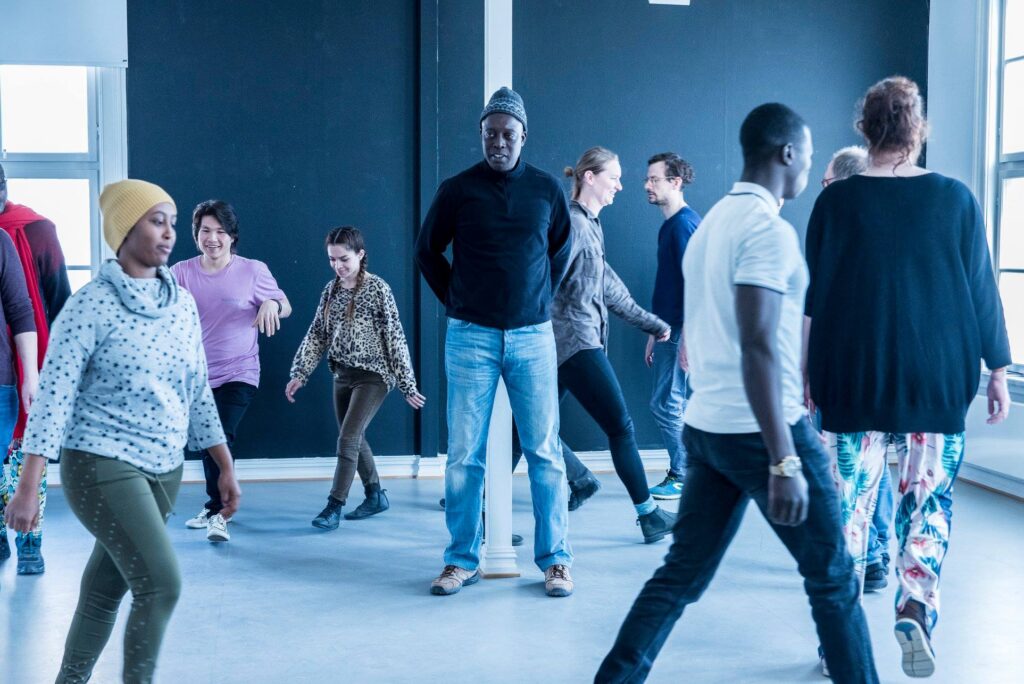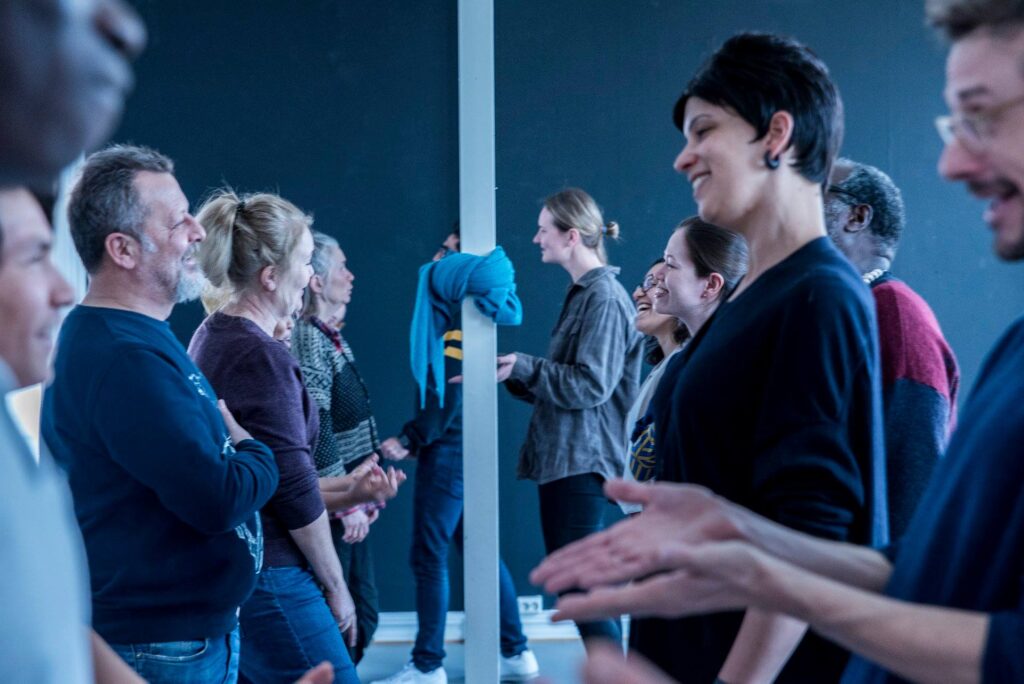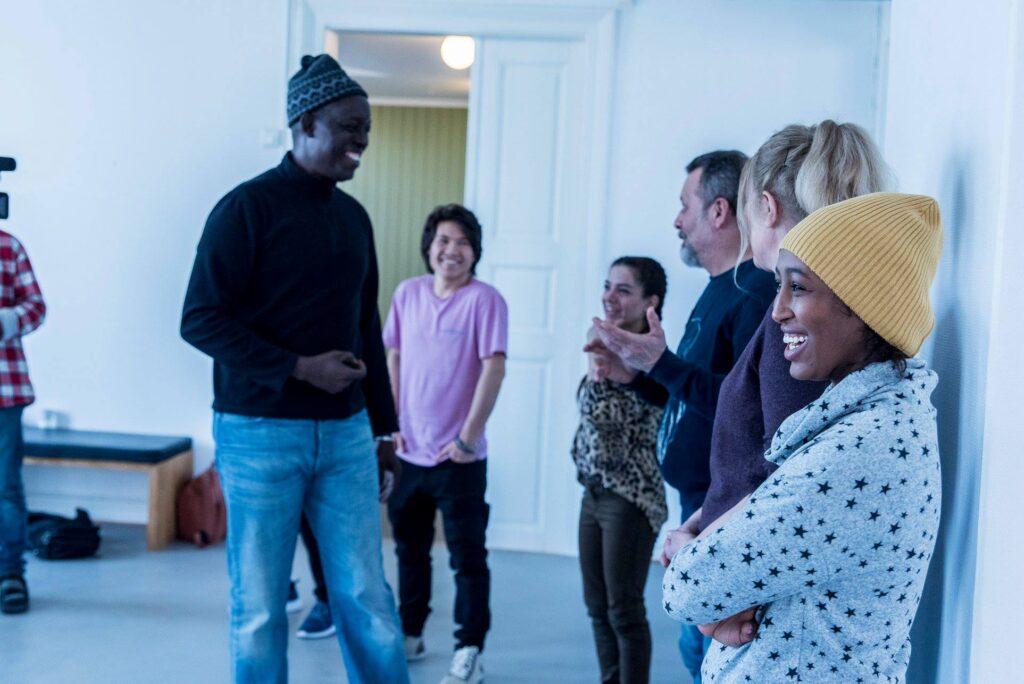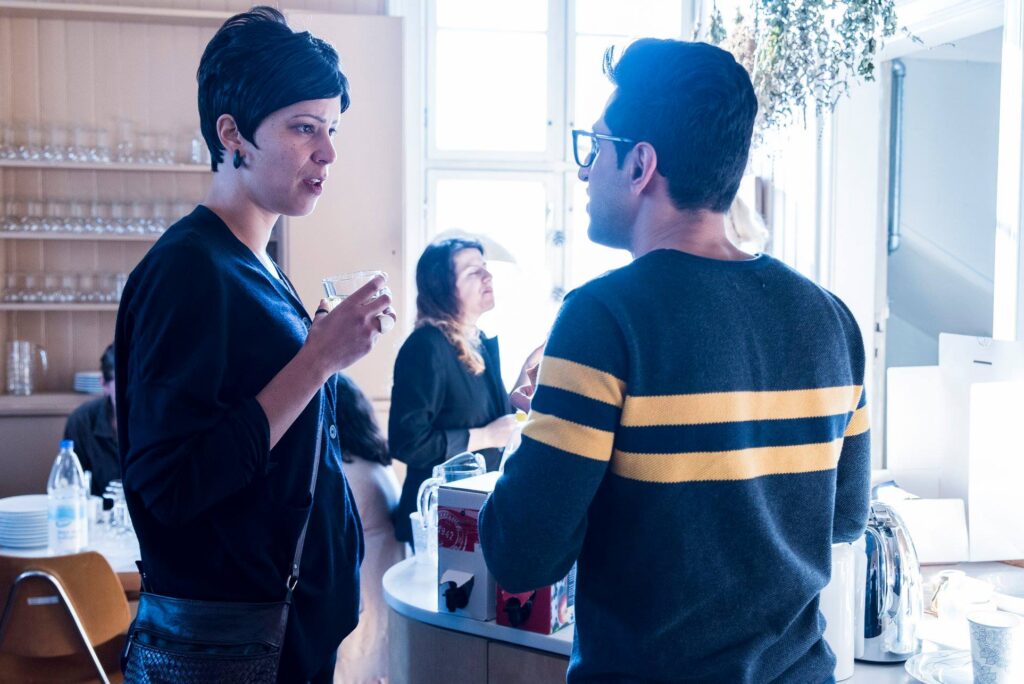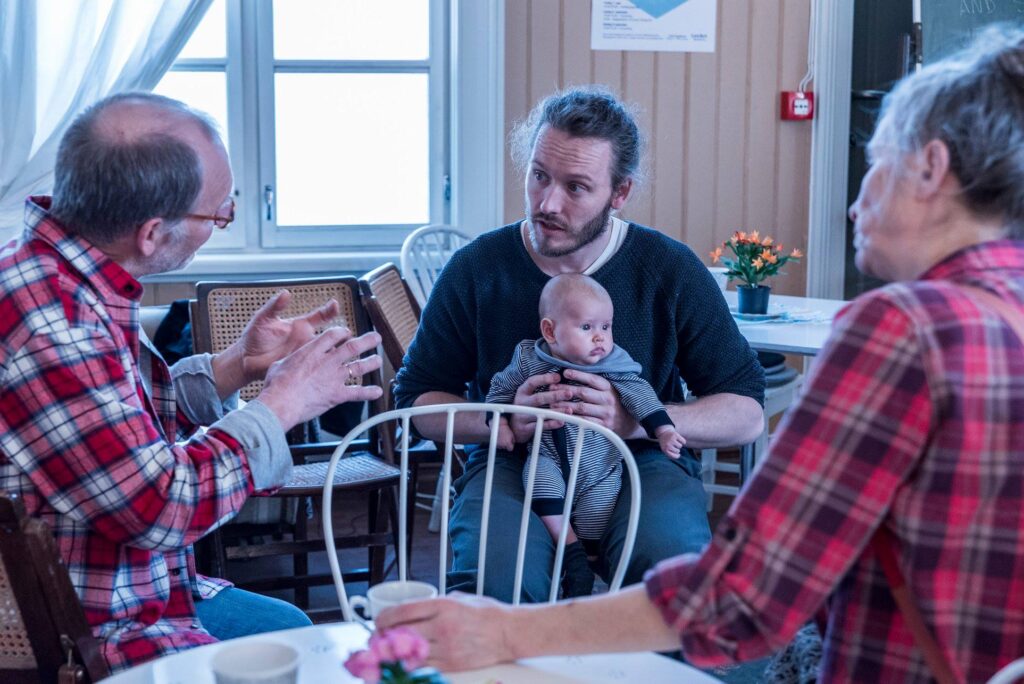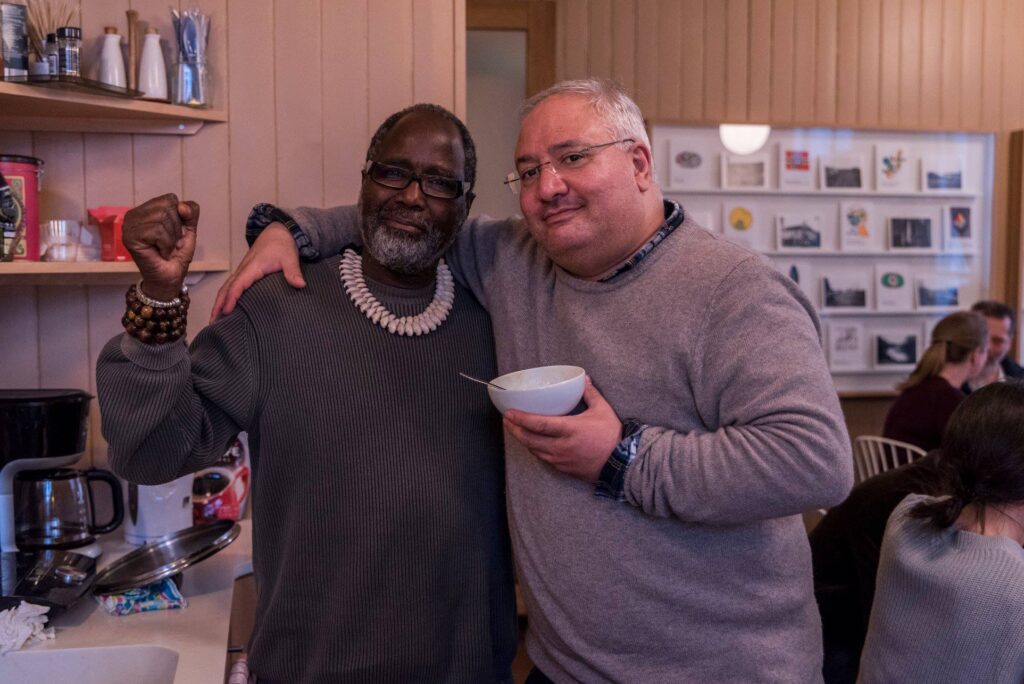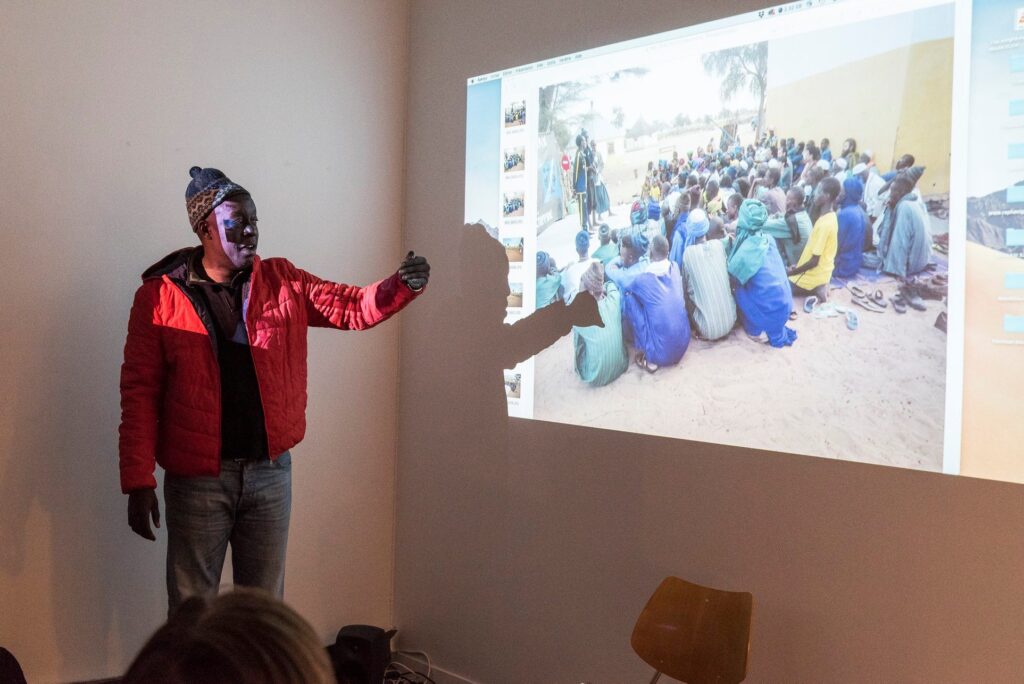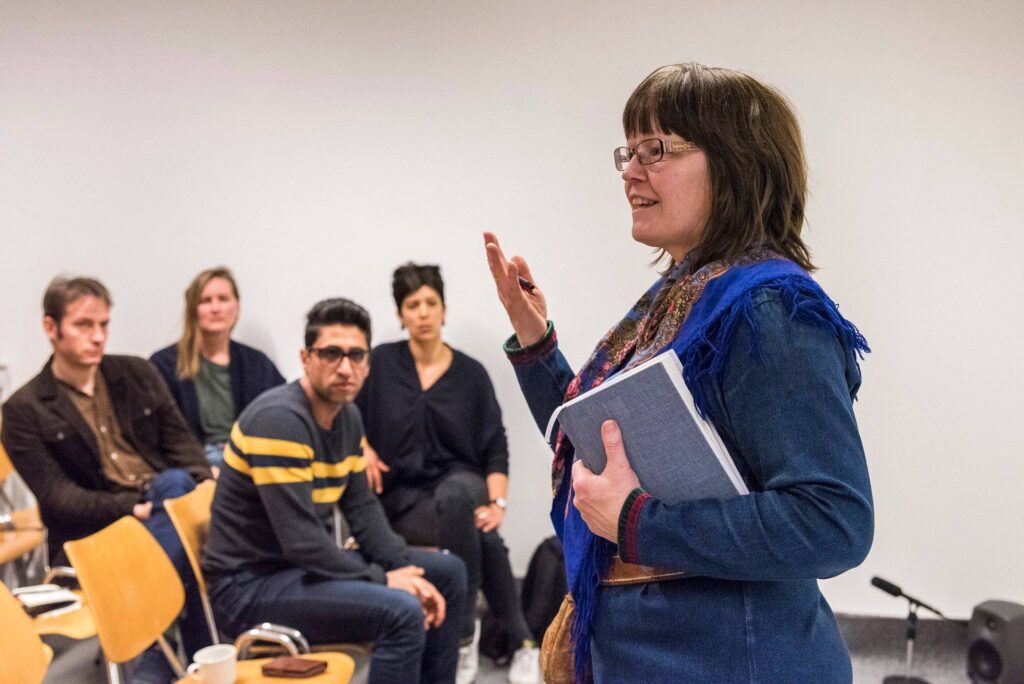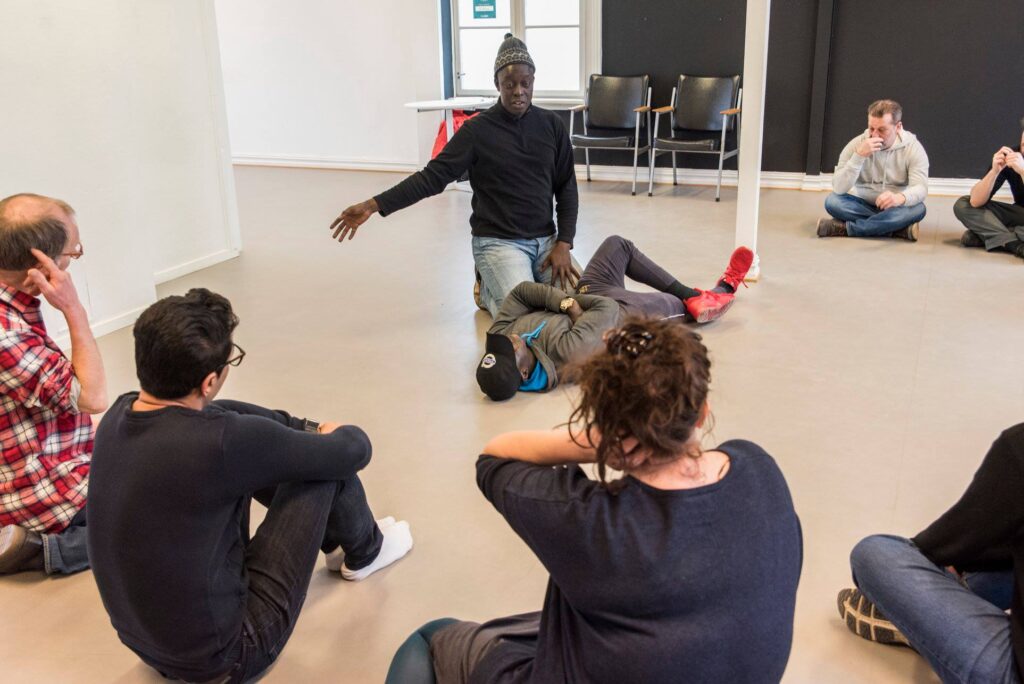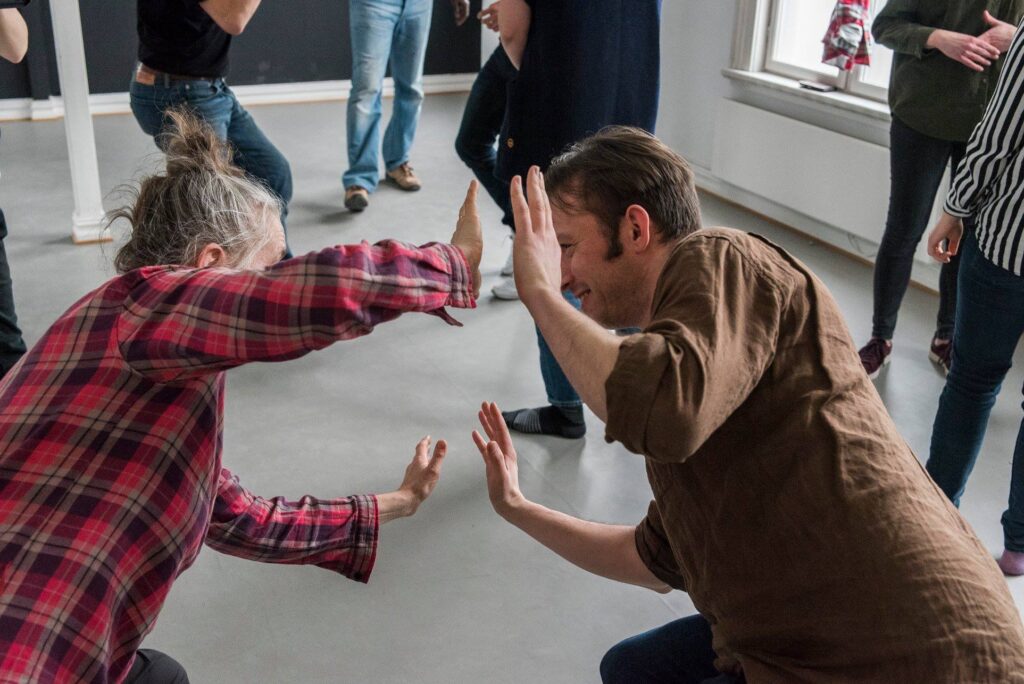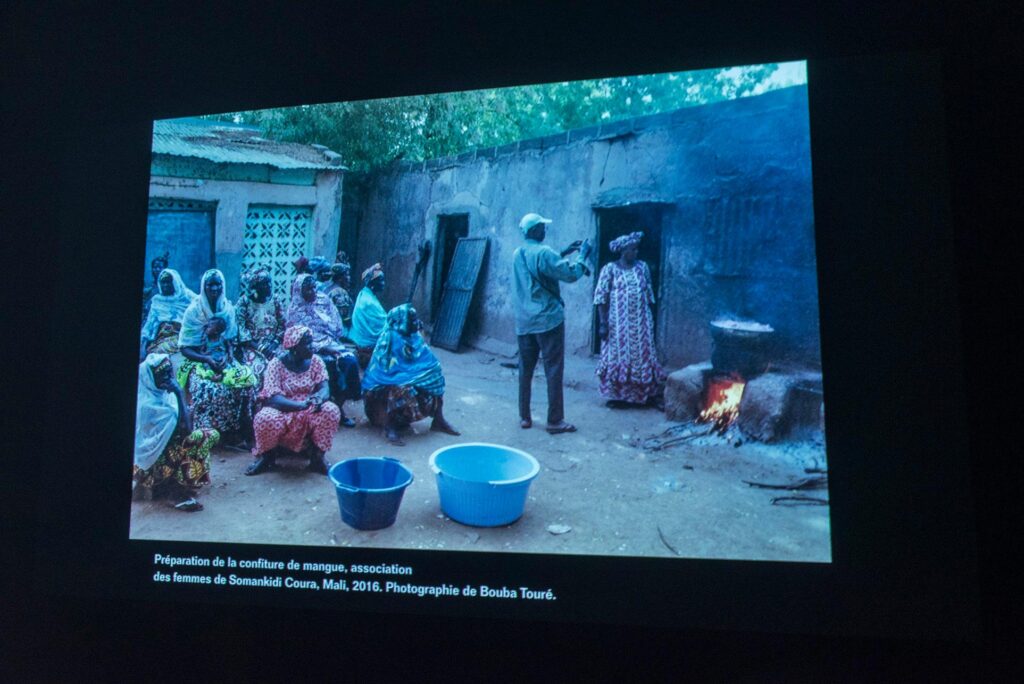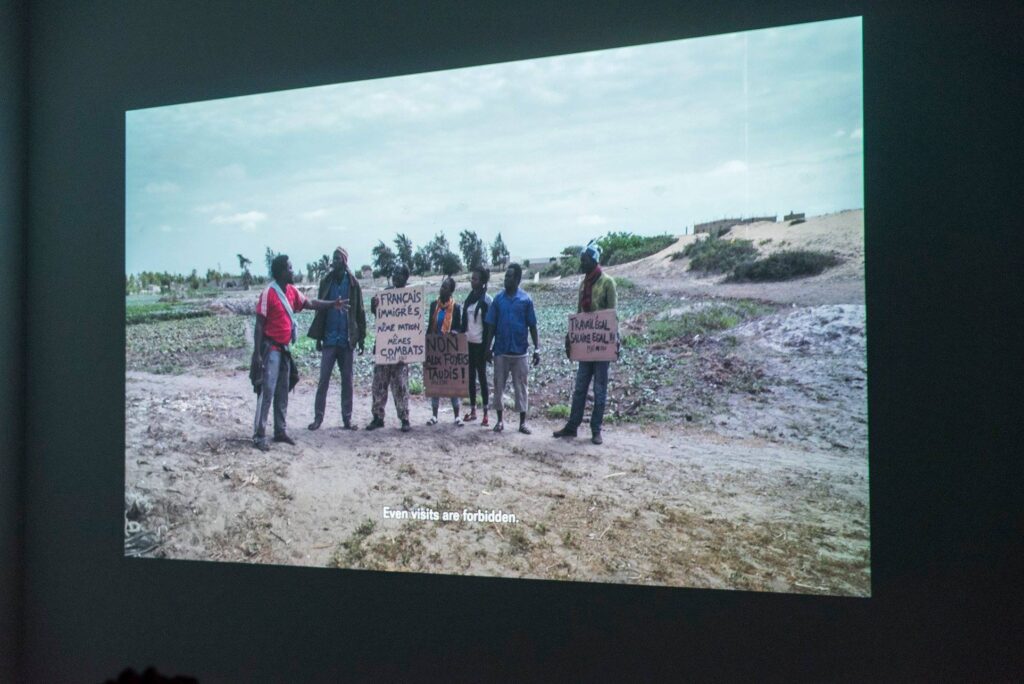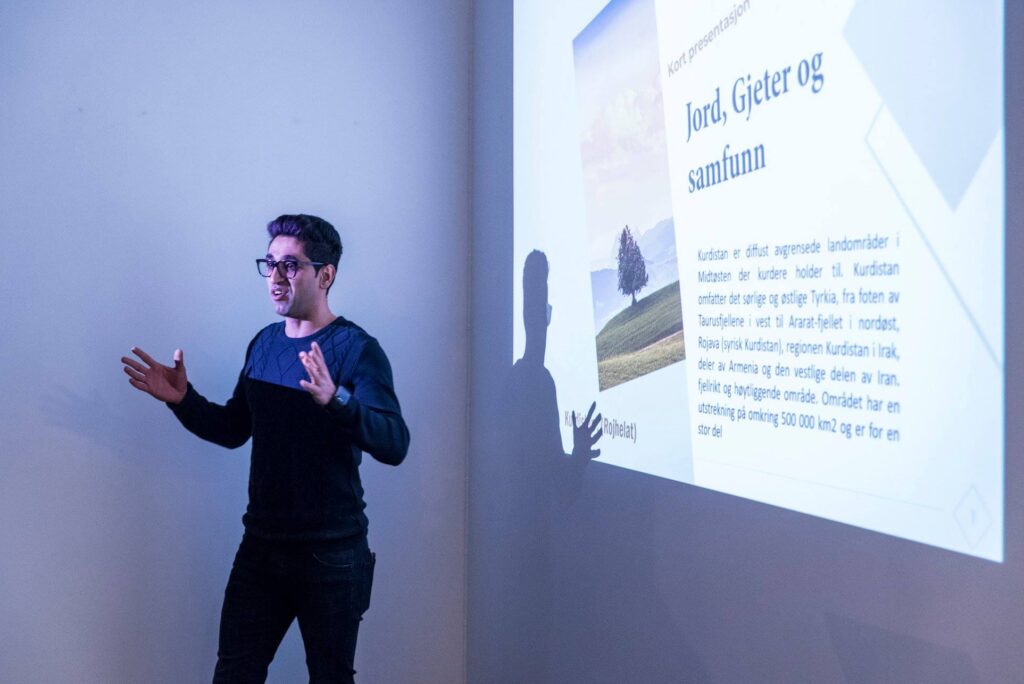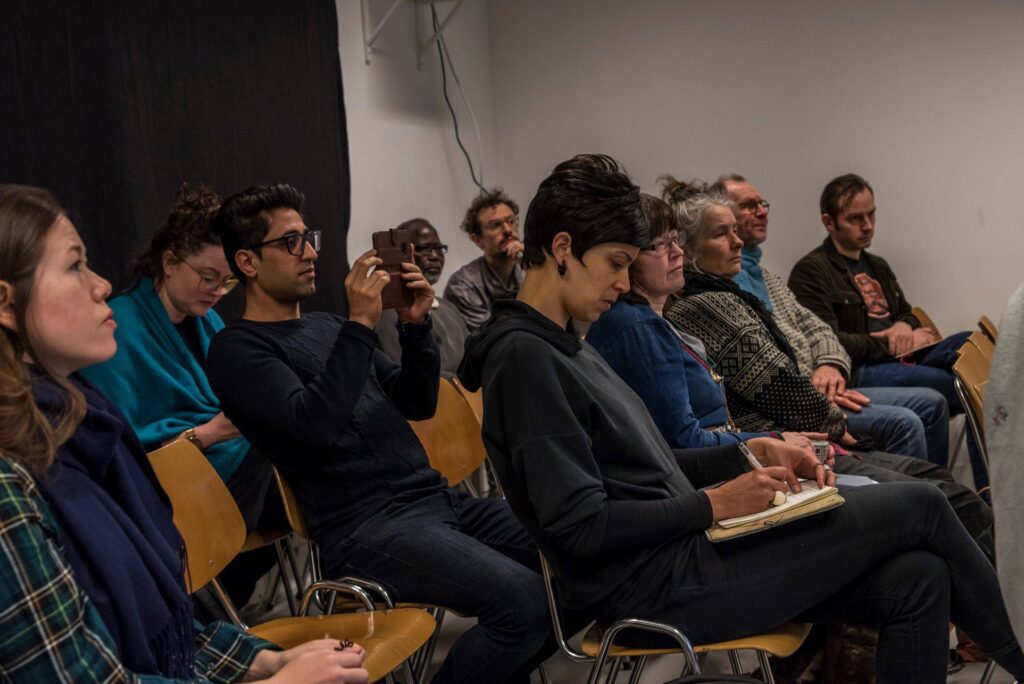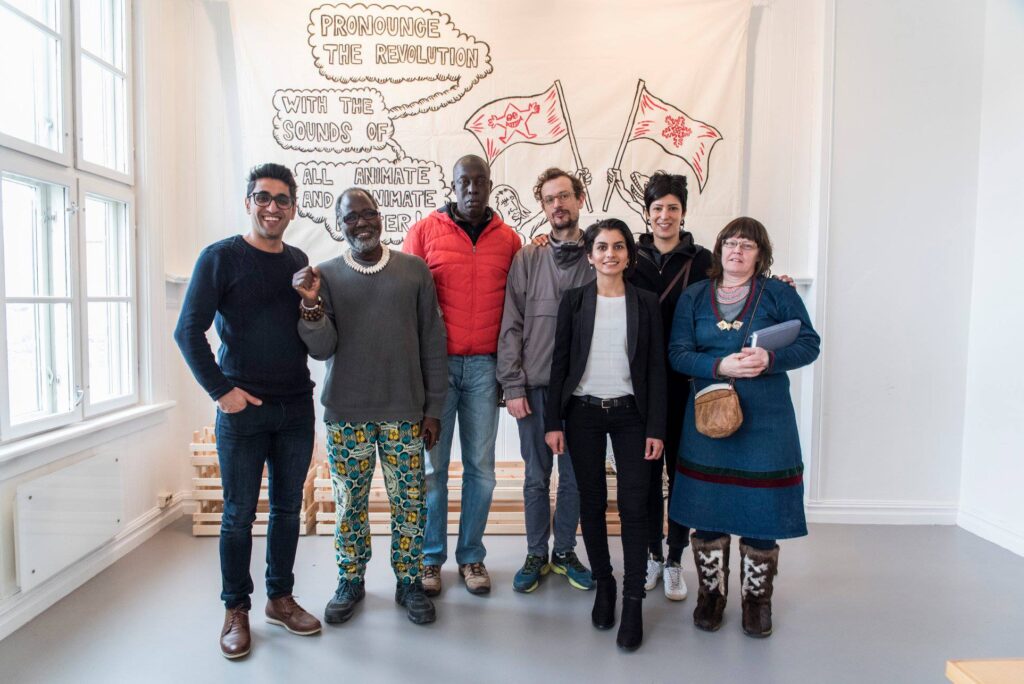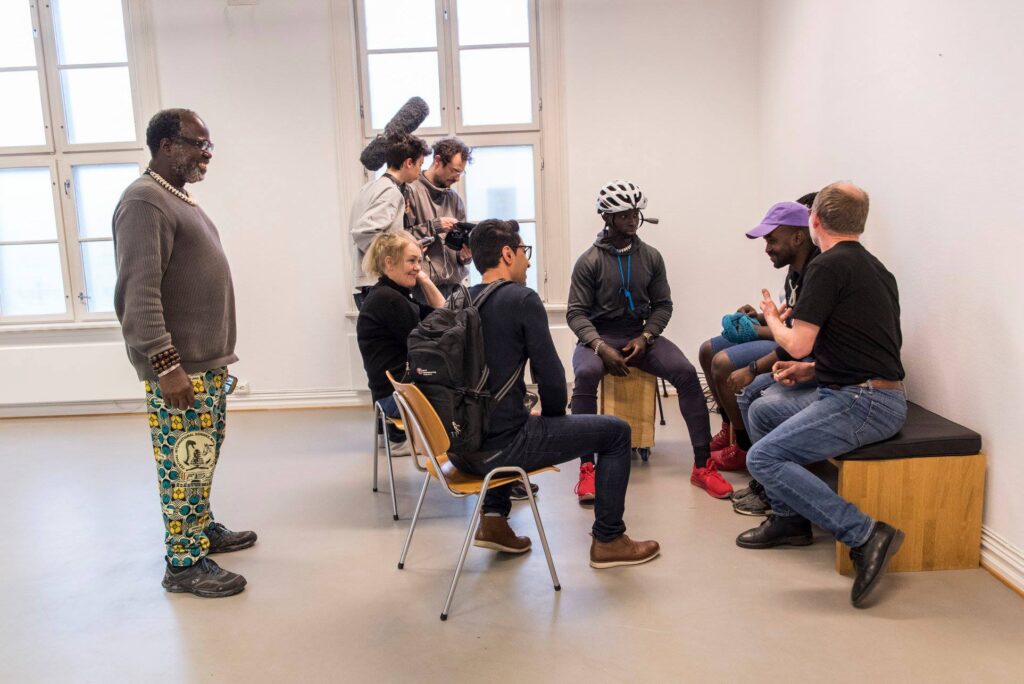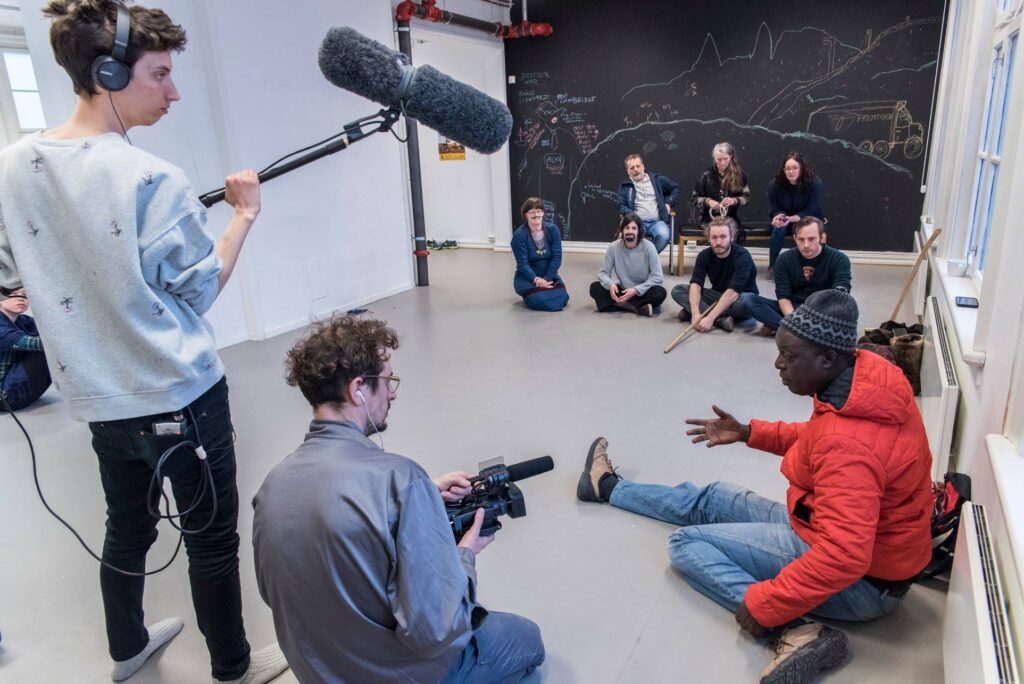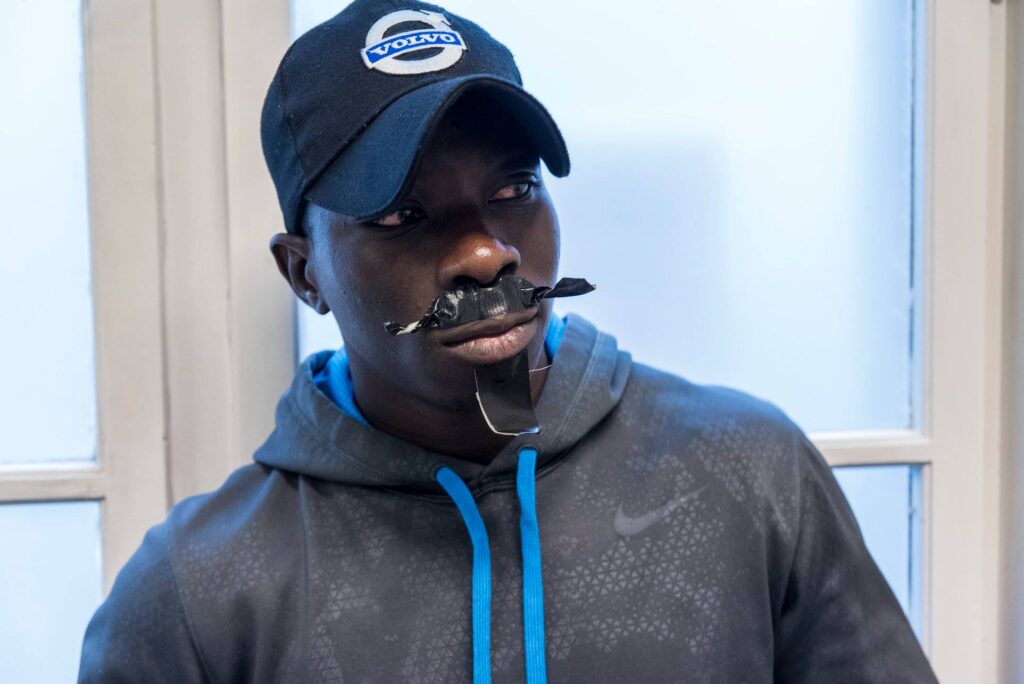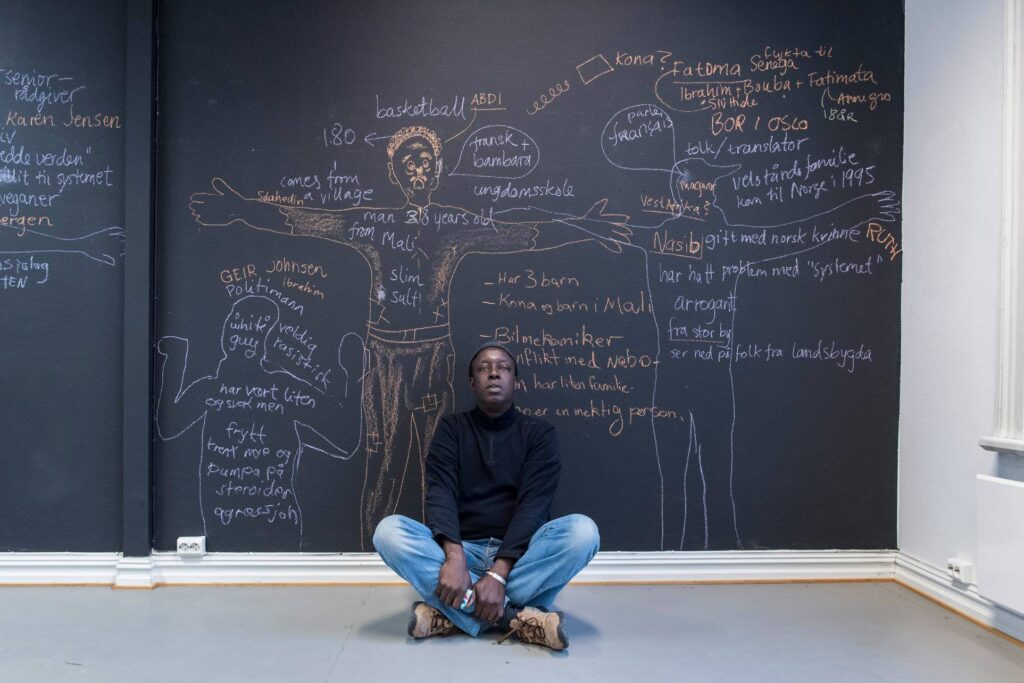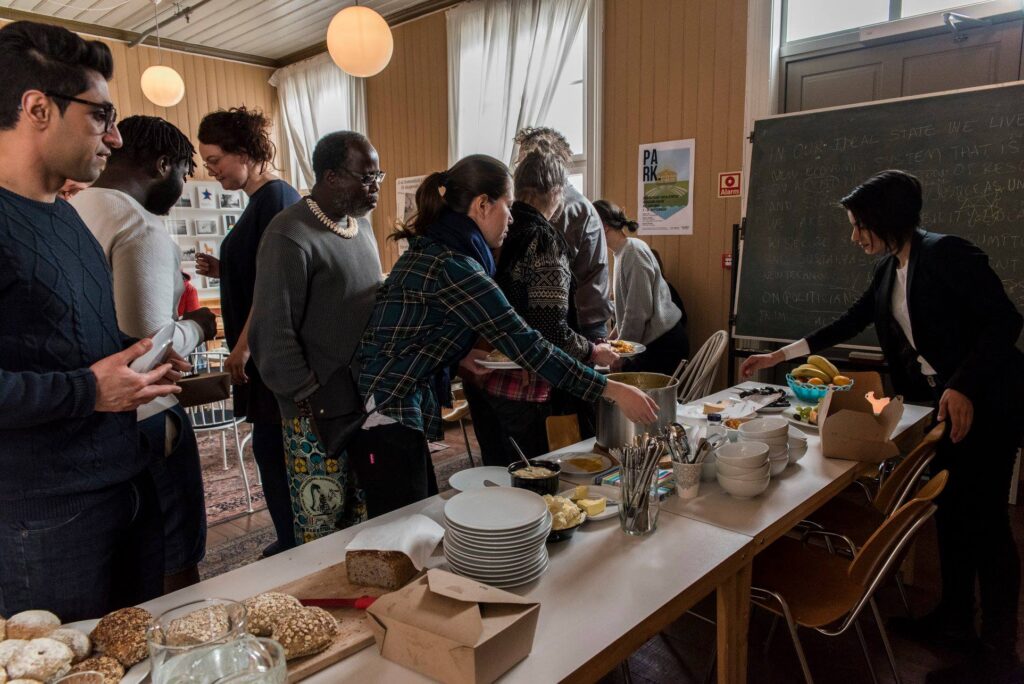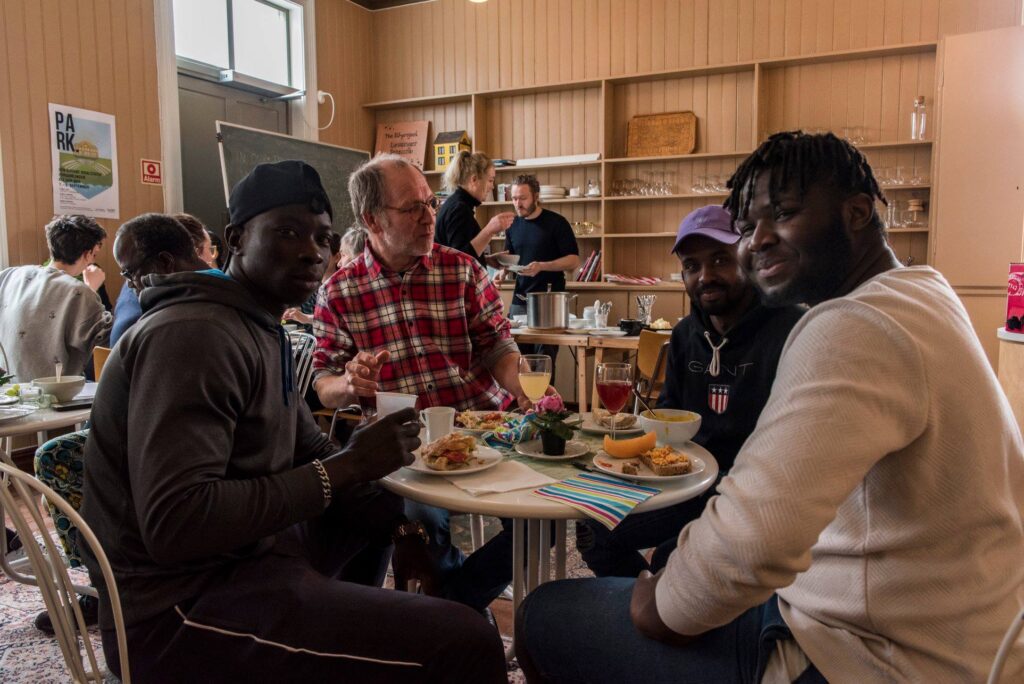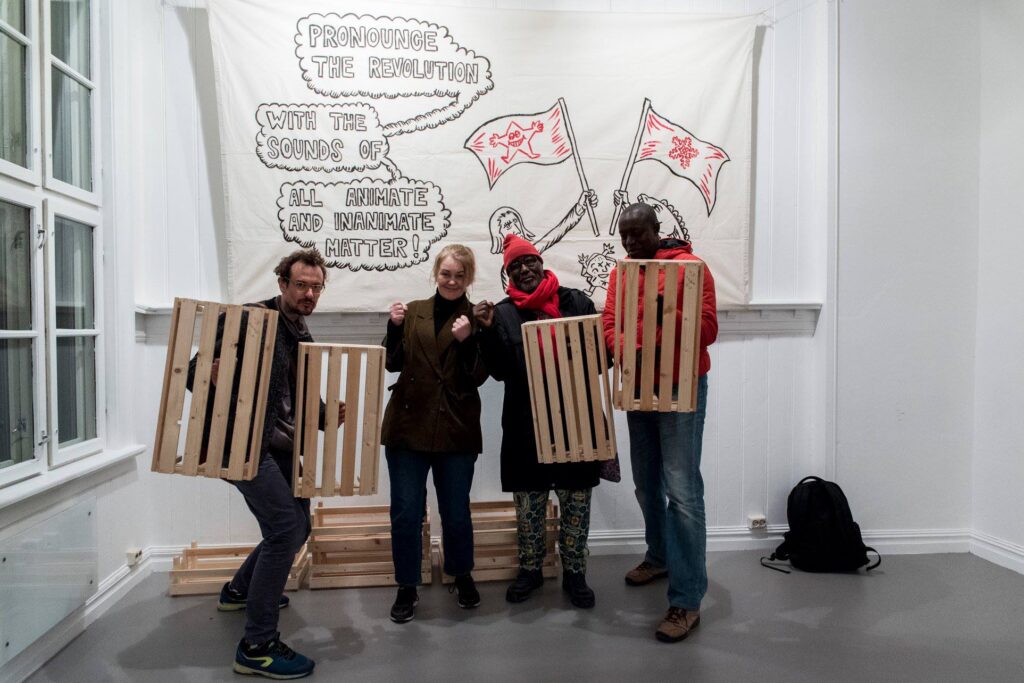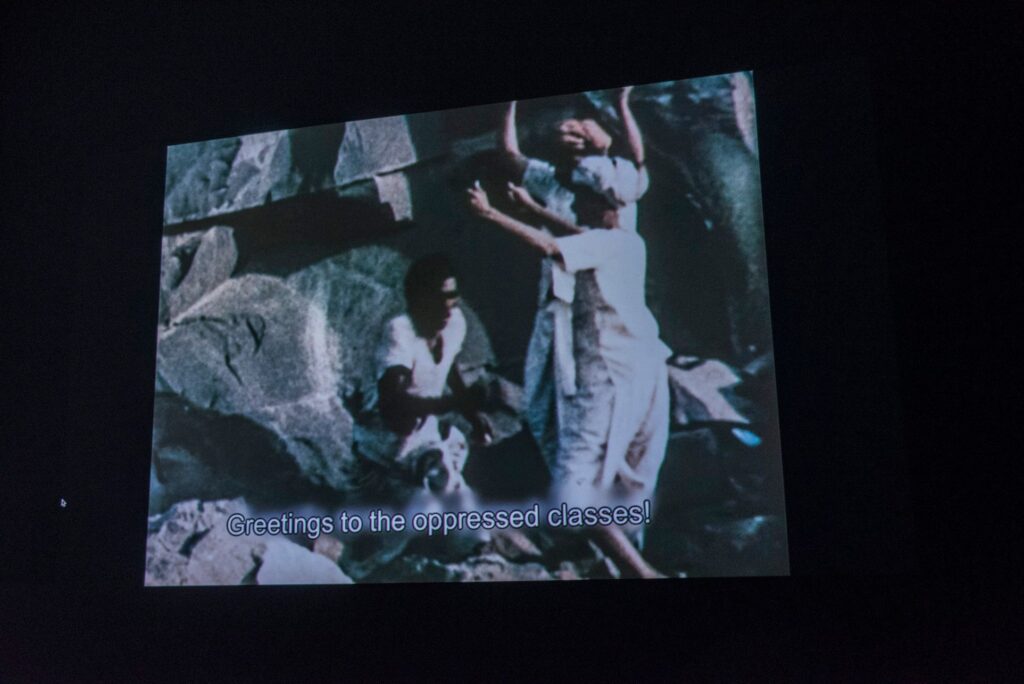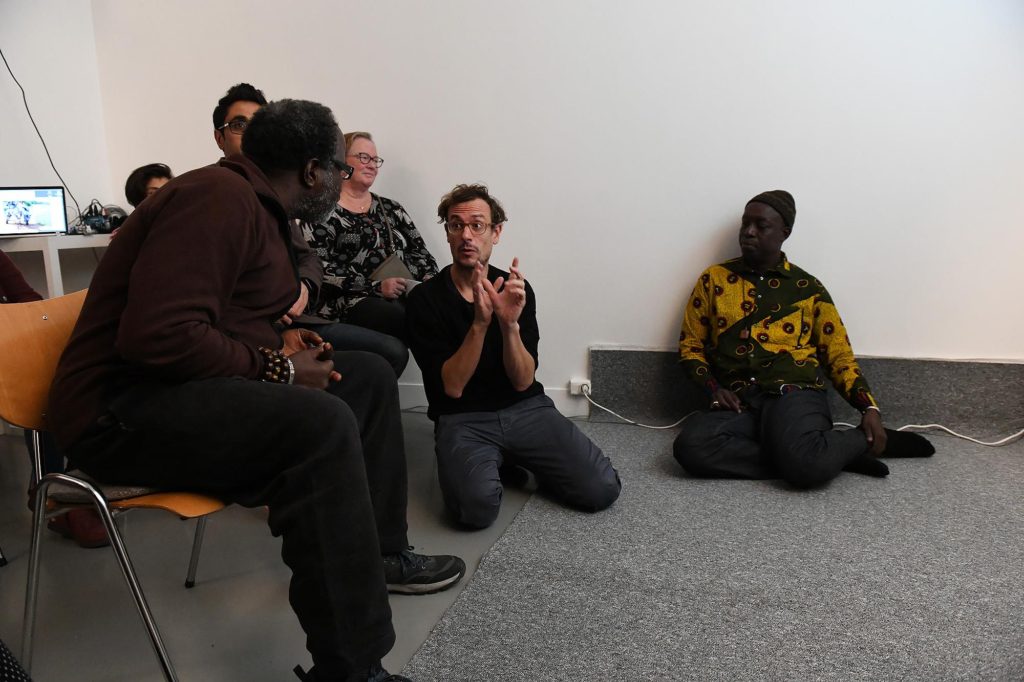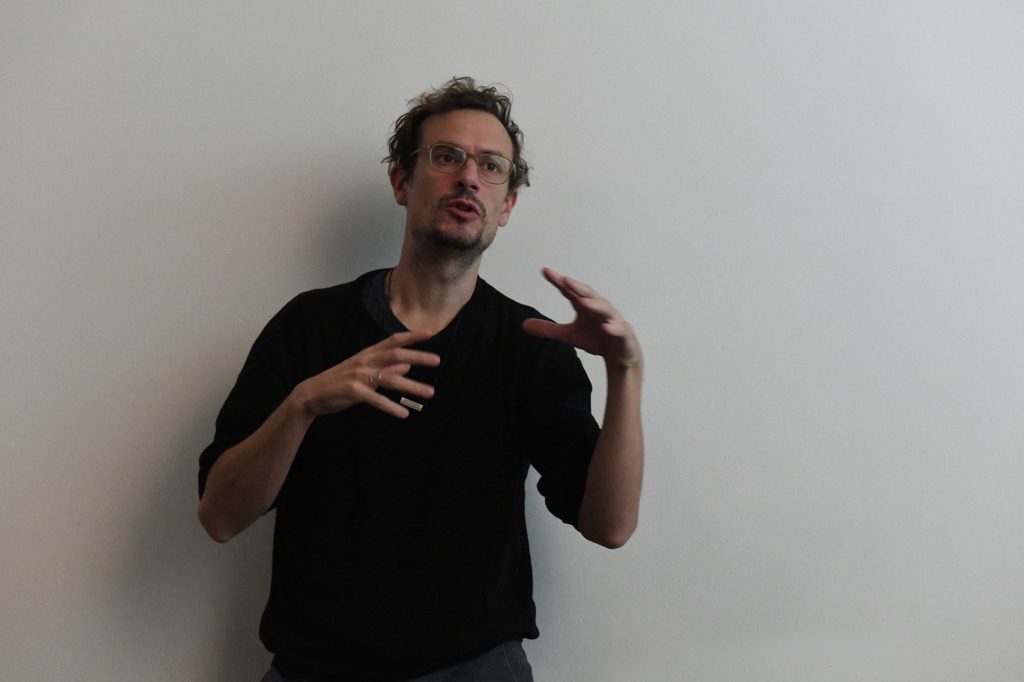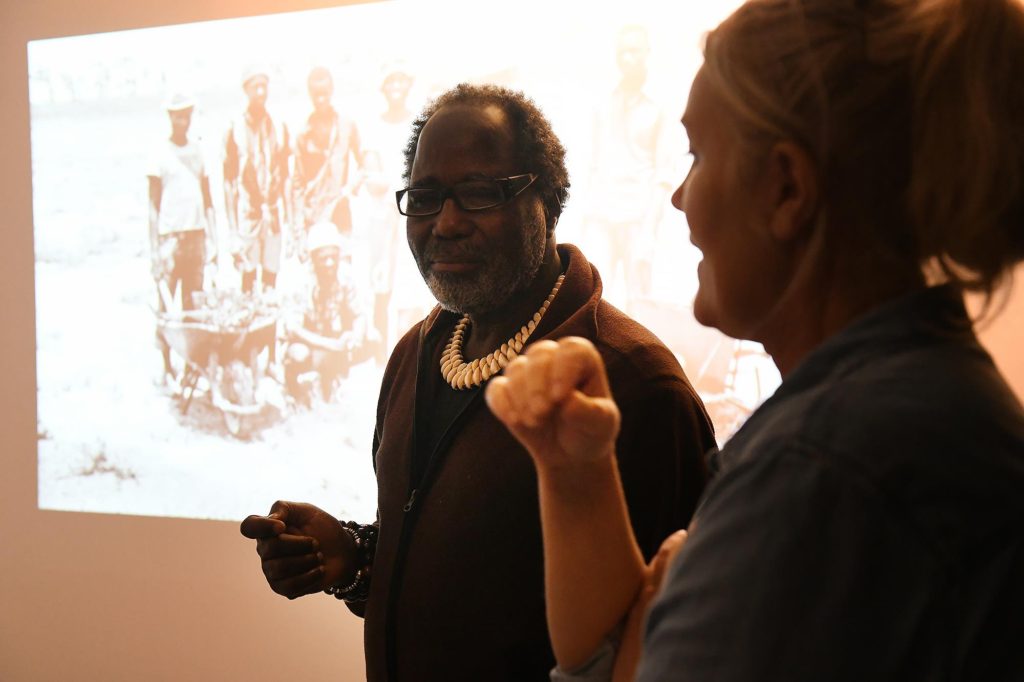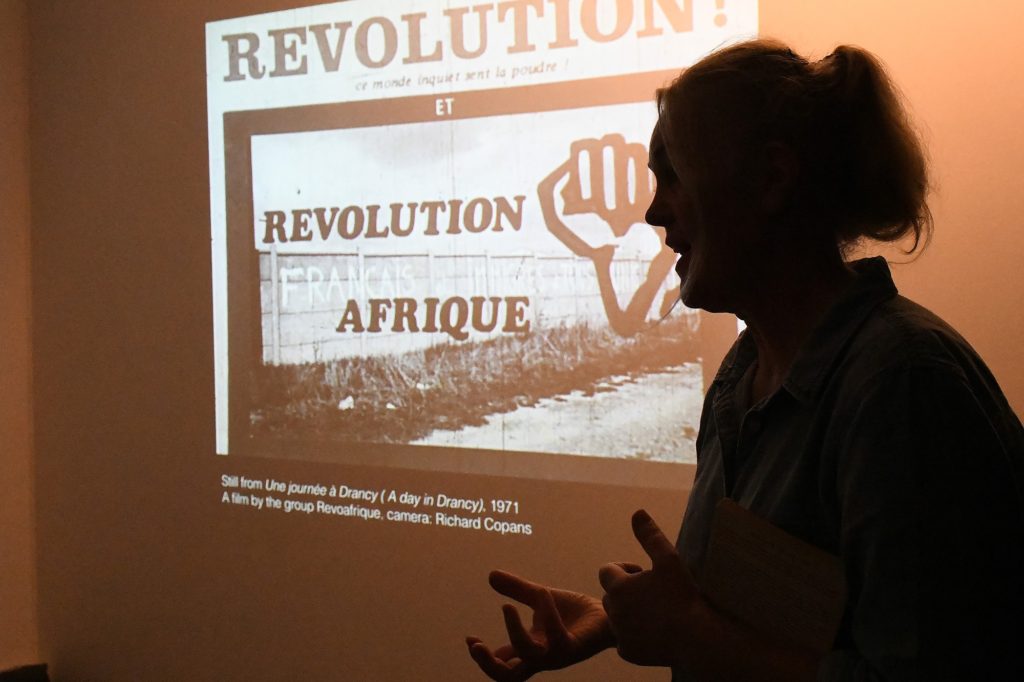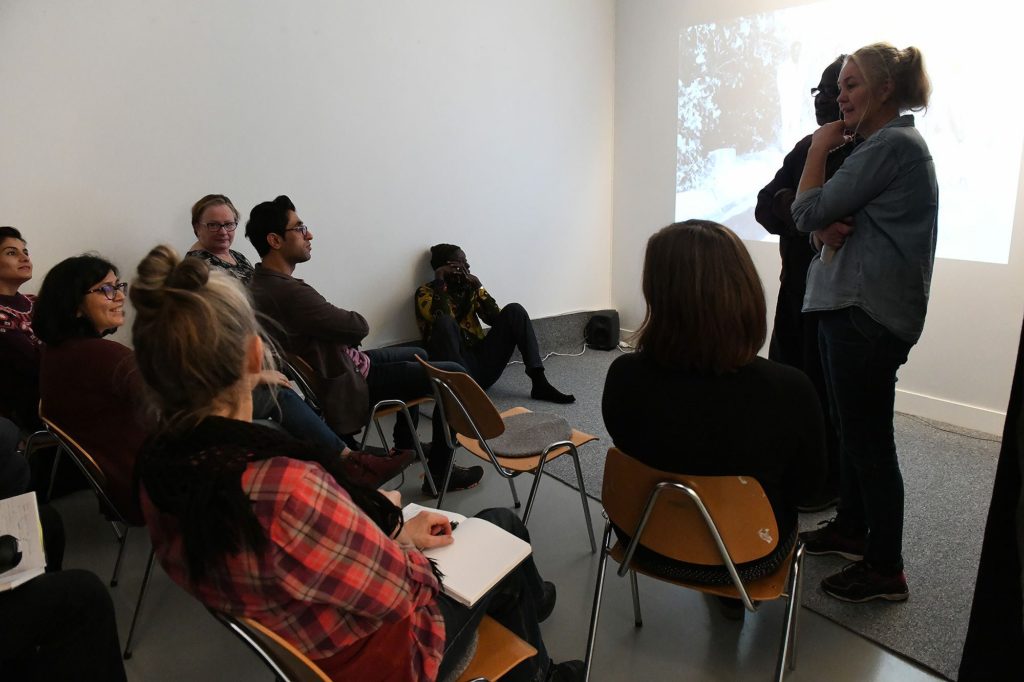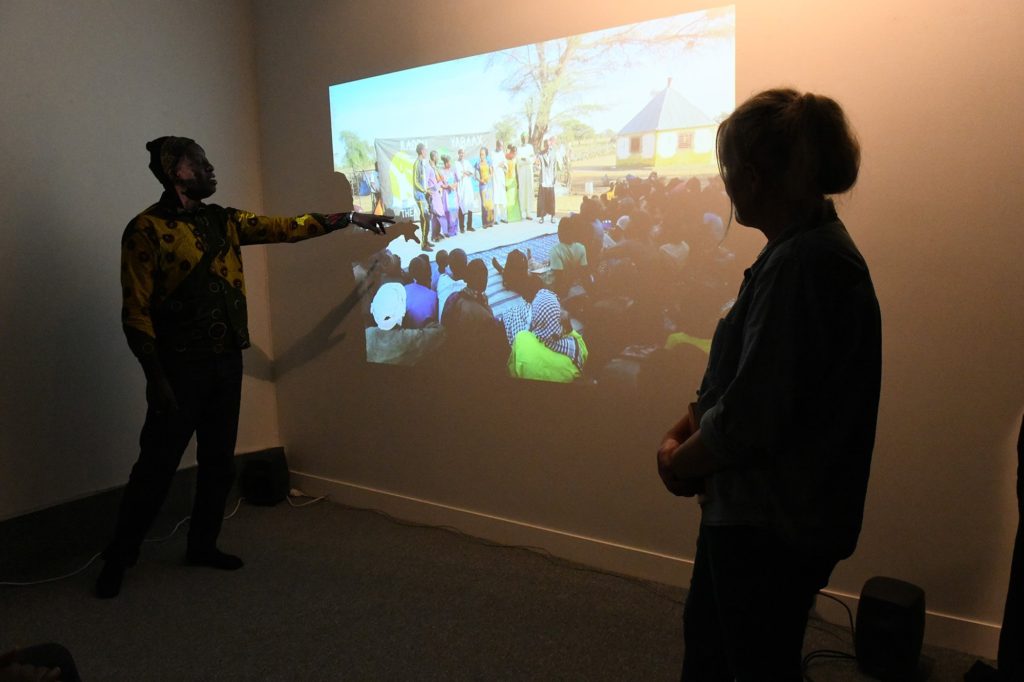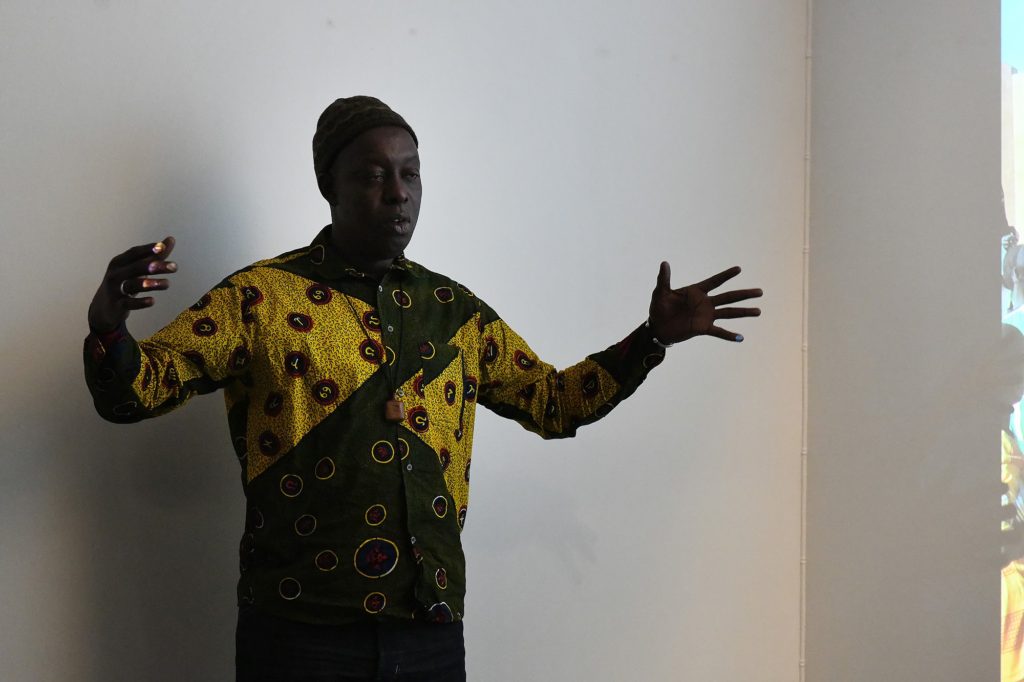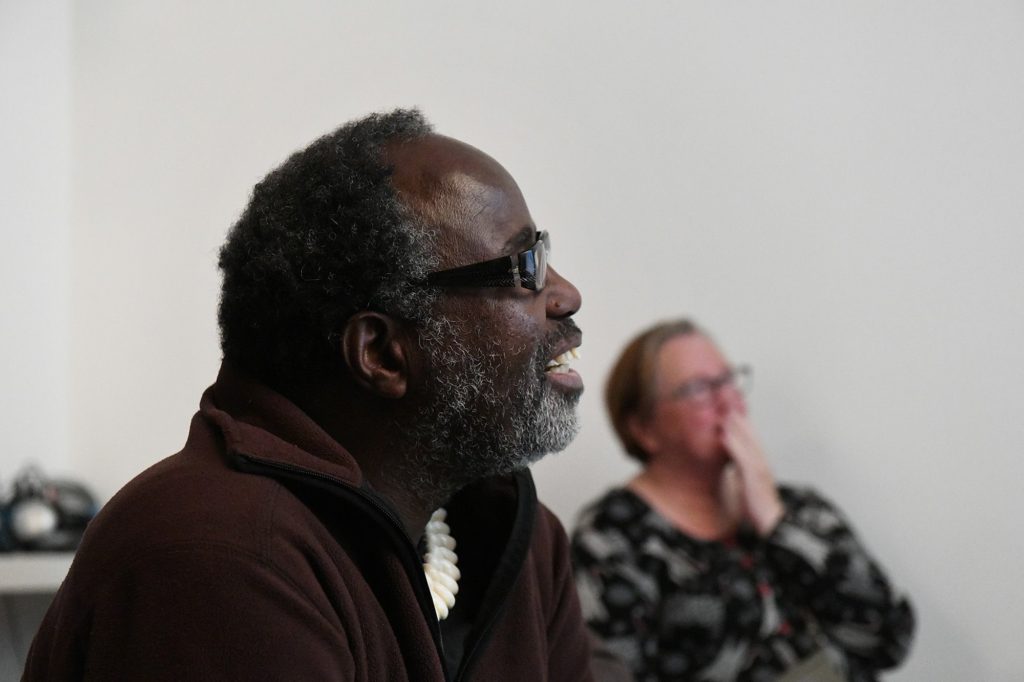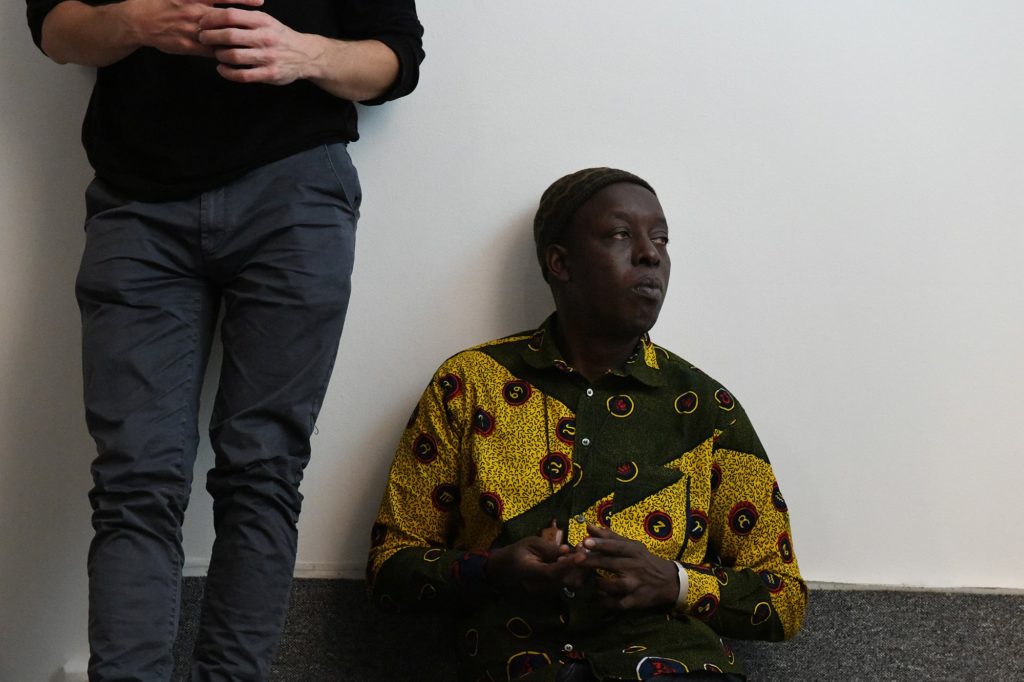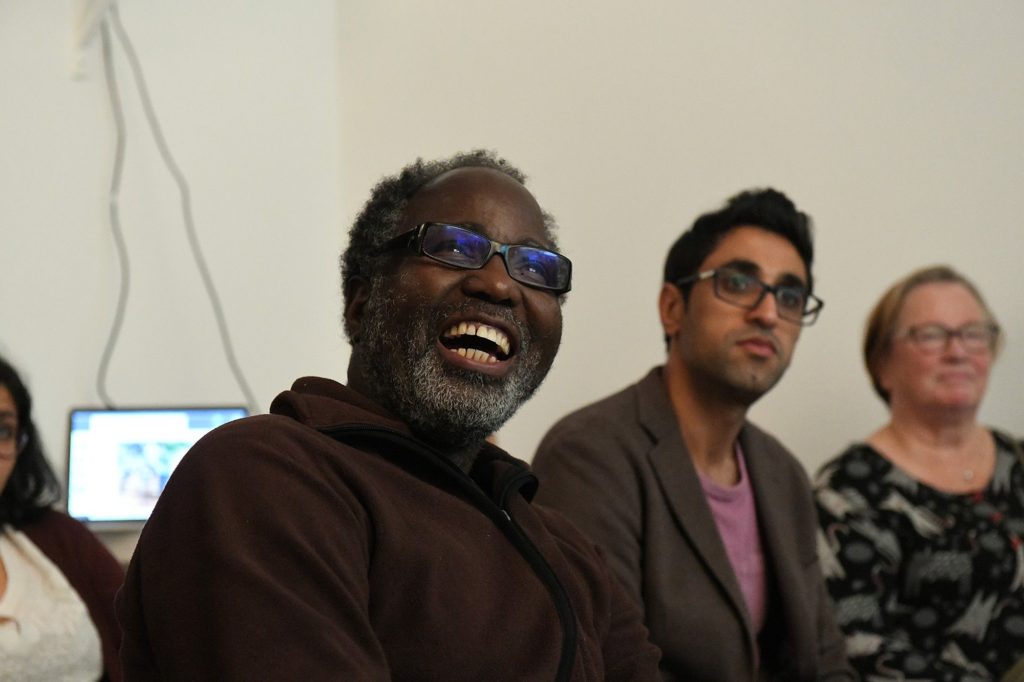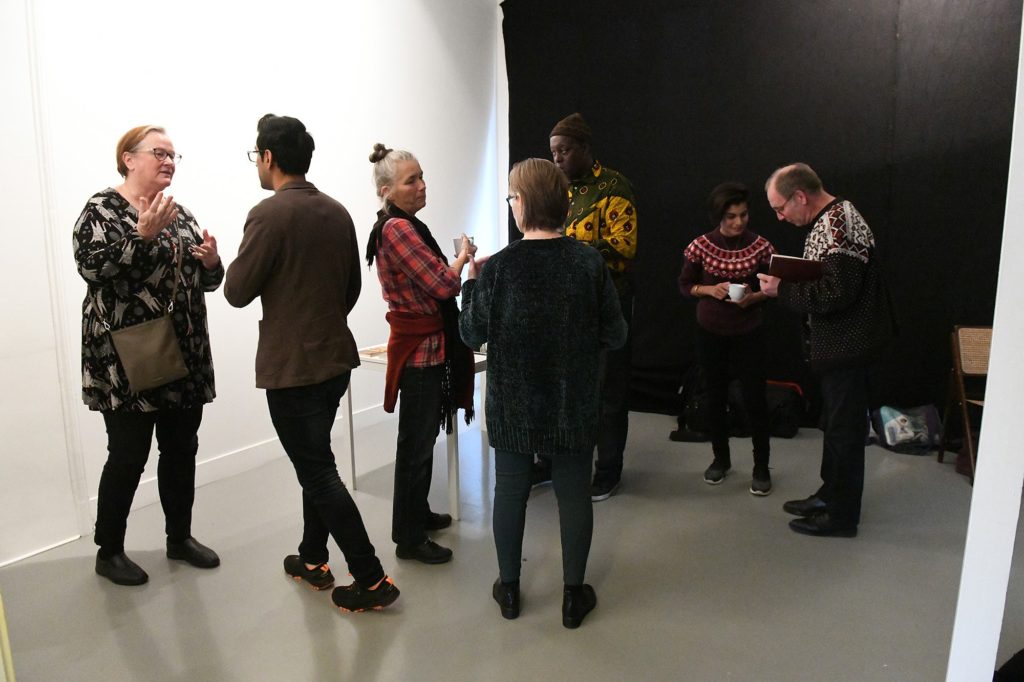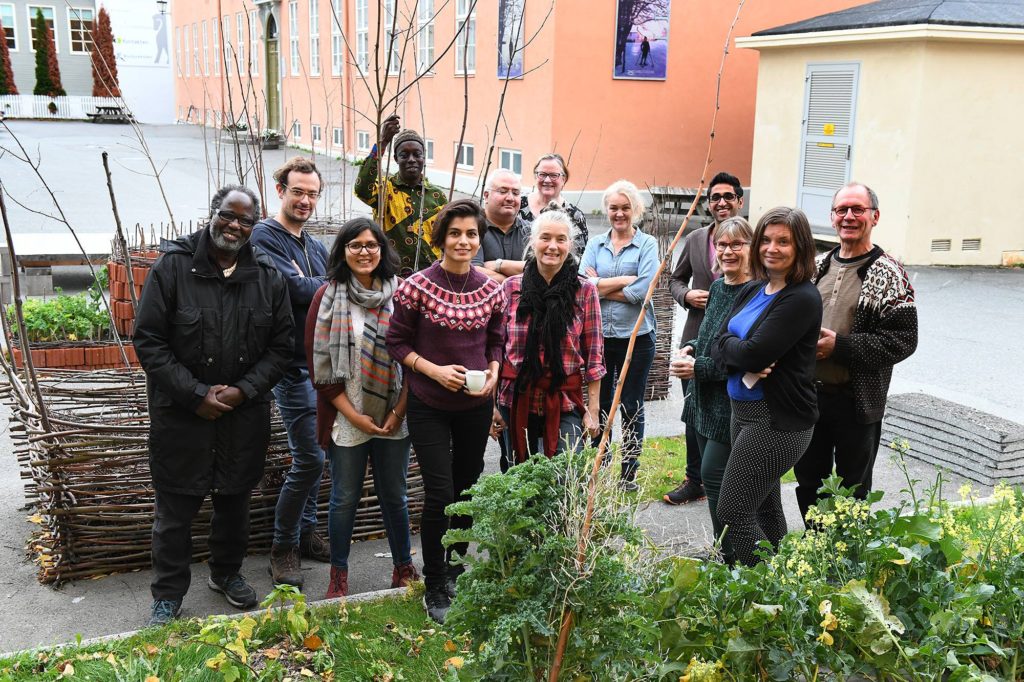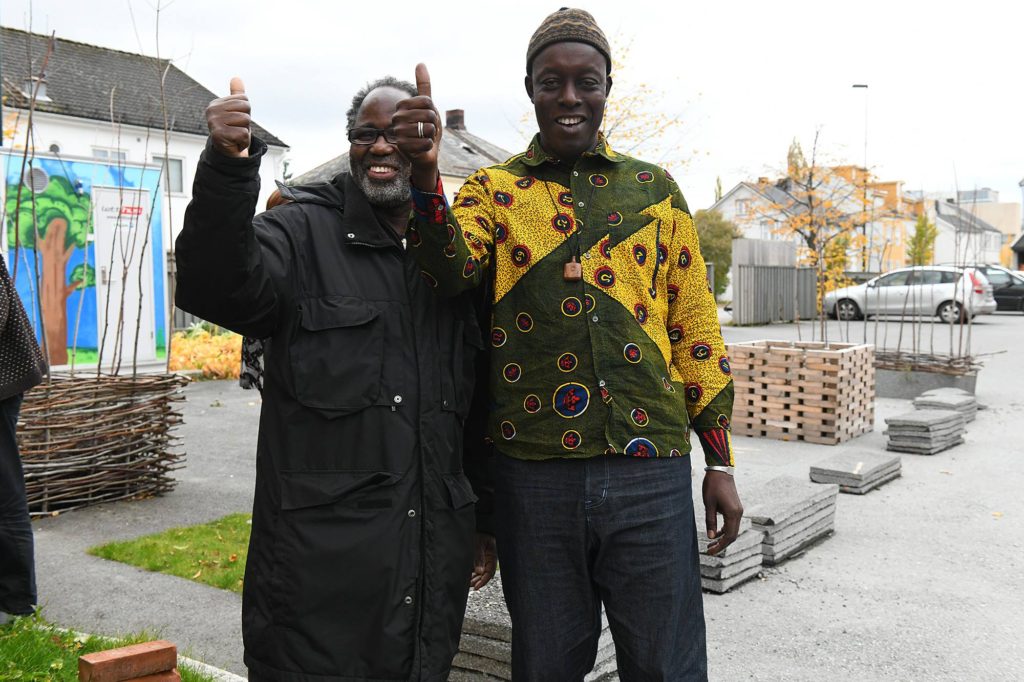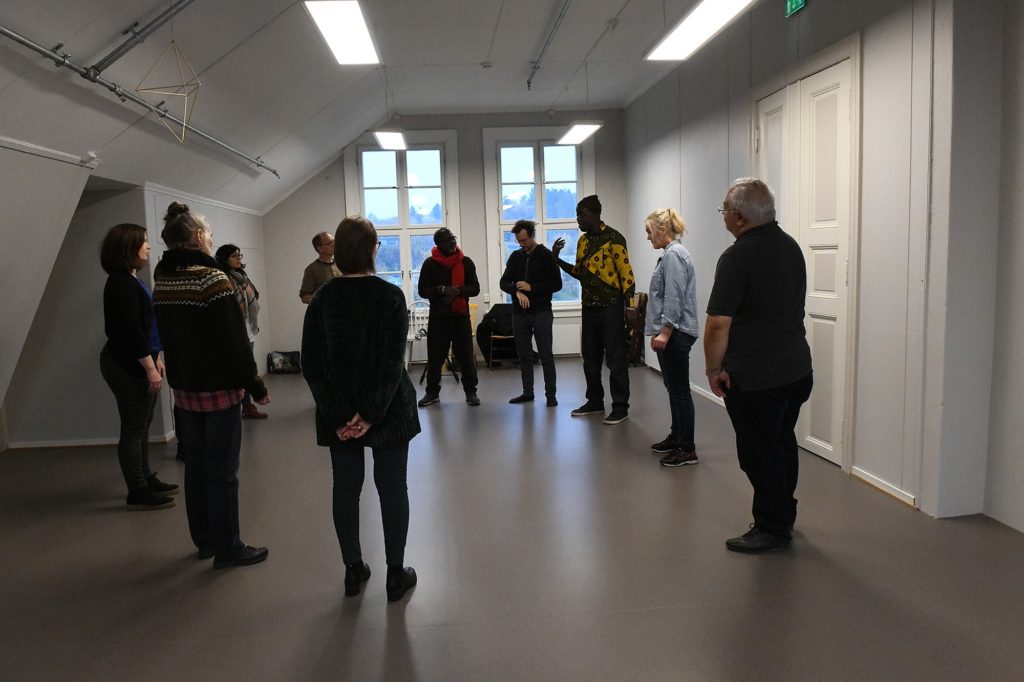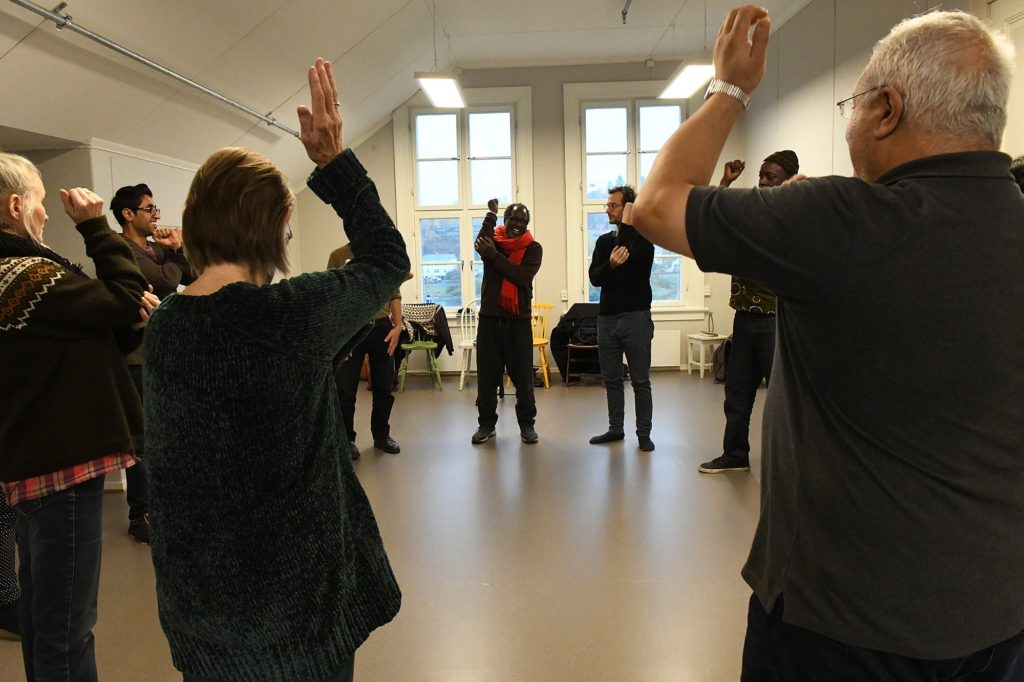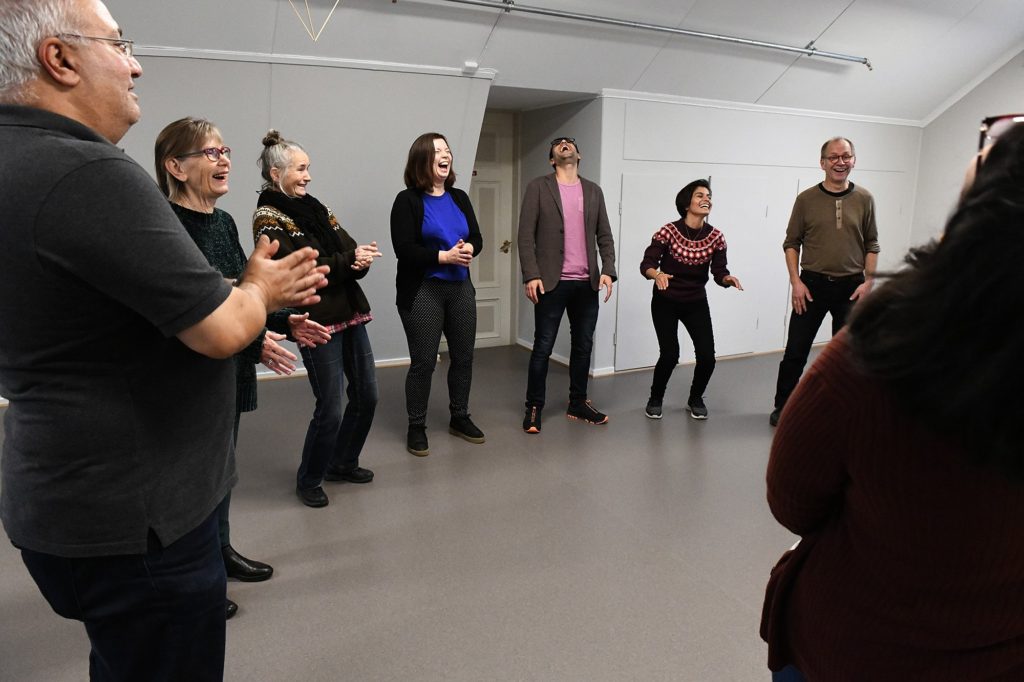Figuring Fallow Time
5 – 7 April 2019 Kàddu Yaraax / Mouhamadou Diol, Bouba Touré, Raphaël Grisey
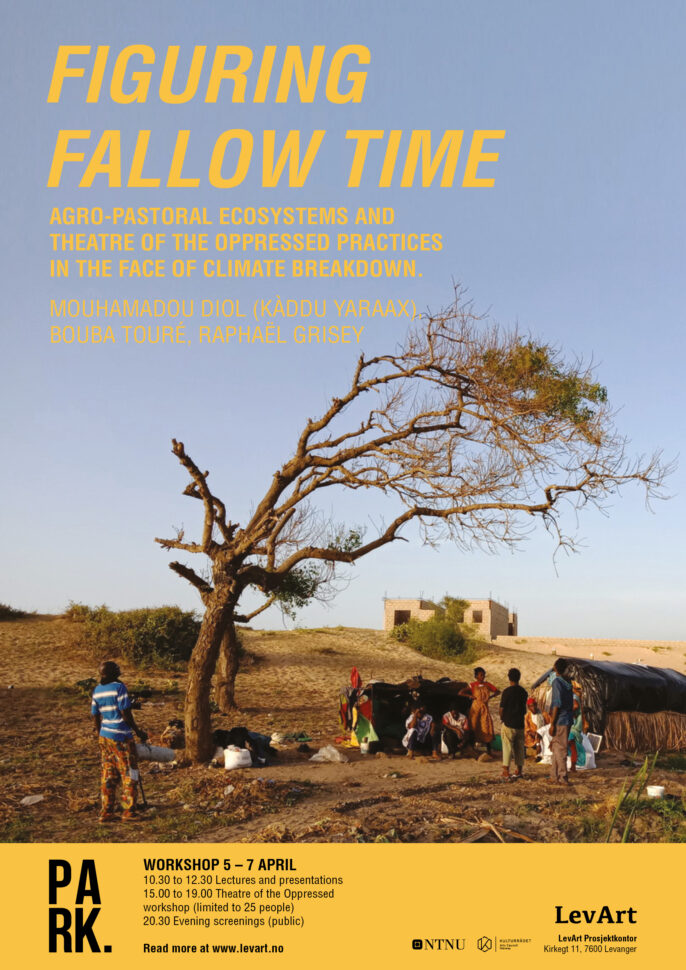
Agro-Pastoral Ecosystems and Theatre of the Oppressed Practices in the Face of Climate Breakdown.
Program for the workshop at LevArt 5-7 April
(Morning presentations and discussions will be developed and transformed in the afternoon sessions.)
5th April, Friday
9.00 Breakfast at LevArt
10.30-12.30 Welcome Introduction to the workshop by Raphaël Grisey.
Presentations: Bouba Touré – history of the Somankidi Coura cooperative in Mali Diol Mouhamadou (Kaddu Yaraax) – experiences from theatre of the oppressed in rural Senegal On cultivation in Trøndelag, intervention by participants
12.30-15.00 Lunch
15.00-19.00 Theatre of the Oppressed workshop “The story of the farmer told by the cow to the worms and to the plants“
19.00 Dinner
20.30 Evening screening – “Mueda, memoria e massacre” [Mueda, Memory and Massacre], Ruy Guerra 1979
6th April, Saturday
9.00 Breakfast at LevArt
10.30-12.30 Lecture by Unni M. Fjellheim (Sami activist and reindeer herder), presentations by Diol Mouhamadou (Kaddu Yaraax) and Shela Sheikh
12.30-15.00 Lunch
15.00-19.00 Theatre of the Oppressed workshop “The story of the bear that tore apart the Sami-Reindeer told by the dog of the Fulani herder“
19.00 Dinner
20.30 Evening screening – Xeex Bi Du Jeex –A Luta Continua ( Raphaël Grisey, Kaddu Yaraax and Bouba Touré), 2018
7th April, Sunday
9.00 Breakfast at LevArt
10.30-12.30 Presentations by Parisa Akbarpour, Salahedin Naderi and Diol Mouhamadou (Kaddu Yaraax)
12.30-15.00 Lunch
15.00-19.00 Theatre of the Oppressed workshop “The story of the farmer told by the cow to the worms and to the plants“
19.00 Dinner
20.30 Evening screening – Ghashiram Kotwal, Yukt Film Cooperative (Mani Kaul), India, 1977
Can we compare agro-pastoral pacts coming from West Africa and Norway, and their correlated ecosystems? Can we queer them and build multi-situated knowledge interfaces without reproducing neo-colonial patterns of extraction?
In this workshop, we propose to learn from the experiences and methodologies of the Theatre of the Oppressed company, Kaddu Yaraax, based in Dakar, and their use of forum theater towards mobilization for social change and political action in local communities in West-Africa. The workshop will navigate between visual and performative arts research, practices of cultivation and herding, migration and translation of situated knowledge and pedagogies. Through methods of improvisation, we will invite participants to bring their personal experiences into the workshop. We aim to create a resonance with (agri)cultural, post-colonial and migration politics in Norway, in order to think of collective modes of resistance to climate change in relation to the violence of extractive capitalism and neo-colonial imaginaries.
The workshop, organized by Raphaël Grisey and Levart, is part of his long-term artistic research project Sowing Somankidi Coura, A Generative Archive, created by Raphaël Grisey in collaboration with Bouba Touré. The research evolves around the (perma)cultures and archives of Somankidi Coura, a self-organized cooperative along the Senegal river founded by a group of former migrant workers and activists in France in 1977 after the Sahel drought of 1973. The exhibition, currently installed at Kunsthall Trondheim, gives a broad presentation of the research.
The workshop at LevArt will be led by Raphaël Grisey, Mouhamadou Diol from Kàddu Yaraax and Bouba Touré. We welcome participants from different backgrounds, but there is a maximum limit of 25 participants. Contact us, with a short motivation note, if you are interested at this e-mail: anne.gro.erikstad@levanger.kommune.no The detailed program for the 3-day workshop will be published soon.
Kàddu Yaraax (Mouhamadou Diol) Forum Theater company founded in 1994, and based in the Lebou village of Yarakh in Dakar and active throughout Senegal. Trainers regularly host Forum Theater workshops for troops from different cities. Kàddu Yaraax works with the tools of the Theater Forum, a branch of the Theater of the Oppressed founded by Augusto Boal around the precepts of the pedagogue Paulo Freire in the 1970s. It uses singing, dancing as well as poetry in collective writing of scenarios. The Kàddu Yaraax Association supports community awareness of all forms of social oppression such as Hann Bay pollution (Dakar), the AIDS epidemic, the consequences of emigration, racism, armed conflicts and intensive farming. The organization is community-based. It has 17 active members, contact persons, who live in the project’s fields of activity and also brings together around thirty people who support and encourage its initiatives. The mission of the association remains the organization of community responses through strategies of diverse social animation. It also works in partnership with public authorities and NGOs to solve socio-economic problems related to, for example, environmental degradation and de-schooling. The association is also active in promoting new development themes, such as a “community school”, promoting solar energy, and human rights. In 2017 and 2018, Kàddu Yaraax, Bouba Touré and Raphaël Grisey collaborated first for the interpretation of Traana – Temporary Migrant, a play written in 1976 by Bouba Touré, and secondly for a workshop that lead to the creation of the collective theatre play and film Xeex Bi du Xeex – A Luta Continua.
Bouba Touré Born in 1948 in Tafacirga near the Senegal River in the former French Sudan that became Mali, and lives in Paris, France and Somankidi Coura, Mali. He went to school in Tambacounda, Senegal, before emigrating to France in 1965. Touré lived in the migrant worker hostel Foyer Pinel with Siré Soumaré. From 1965 to 1970, he worked in the factory Chausson and took part in the strikes from 1966 to 1969. After studies at the Free University of Vincennes and in Montrouge in 1969, from 1971 he worked as a projectionist at Cinema 14 Juillet Bastille and in Cinema L’entrepôt, Paris. A photographer since the 1970s, Touré has been documenting the lives and struggles of migrant workers’ movements, as well as the foundation of the agricultural cooperative of Somankidi Coura in Mali. Since 2008, this working photographic archive has been complemented by video productions. Touré co-founded the ACTAF (Cultural Association of African Workers in France) in 1971 and the Cooperative of Somankidi Coura in 1977 after agricultural internships in Marne and Haute-Marne (France). He has collaborated with Raphaël Grisey on the projects Cooperative (2008) and Becoming Cooperative Archive (2015–). In 2015, he published the book Notre case est ‡ Saint Denis (Our house is in Saint Denis, Éditions Xérographes). Since the 1980s, Touré has exhibited works and given talks in France, the UK and Germany in associative and migrant workers hostels’ circles and more recently at the Contemporary Art Center Les églises, Chelles; Goldsmiths University; Savvy Contemporary, Berlin; Arsenal Kino, Berlin; Documentary Forum, HKW, Berlin; Espace Khiasma, Les Lilas; festival Theaterformen, Braunschweig; The Building, E-flux, Berlin; B-Movie Kino, Hamburg; Caméra des champs Festival, Ville-sur-Yron; Archive Kabinett, Berlin; Spectacle cinéma (USA).
Raphaël Grisey Born in Paris in 1979, lives and works in Berlin and Trondheim. Grisey uses video, editorial and photographic works to gather or produce narratives about the politics of memory, migration and architecture. The book Where is Rosa L. (2001-2006) and the film National Motives (2011) study the ghosts of various political regimes in the public spaces of Berlin and Budapest. Through diverse documentary, fictional or essayist forms, Grisey’s films and installations deal with contemporary social and political issues such as migration and postcolonialism in France (Trappes, Ville Nouvelle, 2003; Cooperative, 2008 and Sowing Somankidi Coura, a Generative Archive 2015– in collaboration with Bouba Touré). He collaborated with Florence Lazar on the films Prvi Deo and Red Star (2006), which deal with post-war former Yugoslavia. Recent film projects were made in France amid students’ strikes (The Indians, 2011), in China amid Míngōng peasant-workers (The Exchange of Perspectives, 2011), in the social housing complex of Pedregulho in Brazil (Minhoc„o, 2011), in the Brazilian Positivist Church in Rio de Janeiro (Amor e Progresso, 2014) and around marooned quilombola communities in Minas Gerais (Remanescentes; A Mina dos Vagalumes, 2015). His work has been shown in various film festivals such as FID Marseille (FR), Hotdocs Vancouver (CA), Doc Lisboa (PR), Forum Doc (BR), Berlinale Forum Expanded (DE). As well as in art centers including: Kunsthalle Budapest (HU), Centre Pompidou, Art Center Les Églises Chelles, Passerelle, Espace Khiasma, CPIF (FR), Casa Encendida (SP), MAM Sao Paulo, MIS (BR), MCA Chicago (US), Savvy Contemporary, NGBK, Halle Für Kunst Lüneburg, Archive Kabinett, Heidelberger Kunstverein, Neuer Aachener Kunstverein (G), 10th Contour Biennale (BE), 2nd Yinchuan Biennale (CN). Fellow of the Norwegian Artistic Research Programme (2015–2018). In 2019, his ongoing artistic research Sowing Somankidi Coura, a Generative Archive, will be presented at the Kunsthall Trondheim, Savvy Contemporary, Den Fries Copenhagen and Contour Biennale Mechelen.
Unni M. Fjellheim
Fjellheim is a mother of four and a «aahka». She is also a spokesperson for the community of Gåebrien sijte. She spent her primary school years at the Sami school in Snåsa, where she learned Sami subjects such as language, Sami cultural history and the Sami craftsmanship duedtie / duodji, which she also practices today. She has followed in her father’s footsteps by becoming a reindeer herder, and lives from and protects «boatsoe» , reindeer husbandry. Today it is important for her to speak in public about Sami history and culture. The silencing of the Sami past as Fennoscandinavia’s indigenous people, and the invisibility of the Sami culture, has influenced the Sami people both collectively and at the individual level. It has also had negative consequences for Norway as a nation and the understanding of how to deal with the environmental challenges and protect the natural beauty and diversity of the country. Fjellheim is a committed activist in the fight against the planned gigantic wind power development, and is fighting to safeguard reindeer husbandry and the natural diversity in the Trøndelag area. The invisibility of the Sami, she says, has made it difficult to unite the forces to defend «Eatneme», mother earth.
Shela Sheikh
Shela Sheikh is Lecturer in the Department of Media, Communications and Cultural Studies at Goldsmiths (University of London), where she convenes the MA Postcolonial Culture and Global Policy and co-chairs the Goldsmiths Critical Ecologies Research Stream. She lectures and publishes internationally. Her research interrogates various forms of witnessing, between the human, technological and environmental. A recent multi-platform research project around colonialism, botany and the politics of planting includes “The Wretched Earth: Botanical Conflicts and Artistic Interventions”, a special issue of Third Text co-edited with Ros Gray (vol. 32, issue 2–3, 2018), and Theatrum Botanicum (Sternberg Press, 2018) edited with Uriel Orlow, as well as numerous workshops on the topic with artists, filmmakers and environmentalists.
The workshop “Figuring Fallow Time” is supported by Arts Council Norway.
Photo: Siv Hilde Meen
______________________
13 October 2018

Image: Raphaël Grisey
FIGURING FALLOW TIME: presentation of the artistic research project Sowing Somankidi Coura, a Generative Archive and a workshop with the Theater of the oppressed / Raphaël Grisey, Bouba Touré and Mohamadou Diol /Kaddu Yaraax
This week we are welcoming new collaborators on the PARK project: Raphaël Grisey, artist and filmmaker, Bouba Touré, photographer and co-founder of the agricultural Cooperative of Somankidi Coura and Diol Mouhamadou from the Theatre of the Oppressed company Kaddu Yaraax based in Dakar, Senegal.
On Saturday, 13th October they will be presenting their practices in artistic research, cultivation and Forum Theatre, translating their situated knowledge to create resonances with (agri)cultural, post-colonial and migration politics in Norway.
This presentation is part of the long-term artistic research project ‘Sowing Somankidi Coura, A Generative Archive’ by Raphaël Grisey in collaboration with Bouba Touré around permaculture and the archives of Somankidi Coura — a self-organized cooperative along the Senegal river founded by a group of former African migrant workers and activists in France in 1977 after the Sahel drought of 1973.
Come listen to their presentations and participate in a Theatre of the Oppressed workshop. The event will be in English and French with simultaneous translation in Norwegian:
Programme Saturday 13.10.2018
13.00 Presentations by Bouba Touré, Raphaël Grisey and Diol Mouhamadou
15.00 – 17.00 Forum Theatre and Theatre of the Oppressed workshop with Diol Mouhamado
Photo: Siv Hilde Meen

